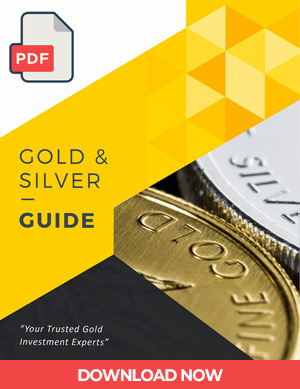Bitcoin’s Volatility Raises Questions that Gold Answers
 Bullion.Directory precious metals analysis 26 April, 2021
Bullion.Directory precious metals analysis 26 April, 2021
By Stefan Gleason
President of Money Metals Exchange
Prices for the cryptocurrency have slid from a high of over $64,000 on April 14th to under $48,000 in trading this past weekend.
The 25% sell-off would be akin to a crash in the S&P 500. But for crypto markets, that kind of volatility is fairly routine.
Bitcoin is still substantially higher for the year. And cryptocurrency “hodlers” continue to eye much higher prices ahead.
Nevertheless, Bitcoin’s volatility makes it very difficult to serve the functions of a conventional currency.
For example, there is virtually no institutional lending or borrowing denominated in Bitcoin.
And few counterparties are willing to sign long-term contracts such as monthly leases with future payments to be made in cryptocurrency.
In contrast to Bitcoin, gold’s volatility profile is much lower.
Having thousands of years of history behind it as a store of value also provides more certainty that gold will continue to hold value far into the future.
Gold is considered by the Bank for International Settlements to be a “Tier 1” asset within the financial system – meaning banks can hold it as qualified reserves with no discount – along with cash and high-quality debt instruments.
While you’re unlikely to be able to walk into a commercial bank and get a certificate of deposit or a loan denominated in gold, you can pledge gold assets as collateral.
Meanwhile, innovations in gold-backed finance are making interest-bearing gold instruments a reality.
Monetary Metals & Co. issues gold-based bonds: “A Gold Bond is similar to a conventional dollar bond, except that the face value is denominated in ounces of gold, and the interest and principal are paid in gold.”
Meanwhile, Money Metals Capital Group offers loans against physical precious metals holdings.
If you own at least $35,000 worth of precious metals and store them in the Class 3 vaulting facility operated by Money Metals Depository, you may be eligible for a low-interest loan for business or investment purposes (if allowed in your state).
Another way gold can be harnessed for financial transactions is through gold clause contracts that define gold as the means of payment. They allow both parties to an exchange to avoid transacting in dollars.
Gold clause contracts can be especially useful in long-term agreements such as loans and leases. If you’re going to be the recipient of a long-term payment stream, you can avoid the risks of currency debasement by insisting on gold. And if you’re going to be the one making payments, offering to pay in gold can give you leverage to negotiate for better terms.
A gold clause contract is perfectly legal. That said, there are many nuances that go into drafting it properly. Full enforcement of the contract to prevent dollars from being substituted for gold will depend on your state’s laws.
Some legal and tax barriers to gold and silver being able to compete freely with the U.S. dollar exist at both the state and federal level.
One of the biggest impediments is that gold and silver aren’t recognized as money in the tax laws. Therefore, federal income taxes are imposed on realized “gains” on sound money (which are largely a reflection of losses in the dollar’s purchasing power).
Rep. Alex Mooney’s Monetary Metals Tax Neutrality Act (H.R. 2284) would clarify that the sale or exchange of precious metals bullion and coins are not to be included in capital gains, losses, or any other type of federal income calculation. “My view, which is backed up by language in the U.S. Constitution, is that gold and silver coins are money and are legal tender,” Rep. Mooney said.
There is obviously no Constitutional basis for Bitcoin as money. Cryptocurrency has recently drawn the ire of politicians and regulators, who are bent on restricting or banning its use, in a way that gold hasn’t.
That doesn’t mean cryptocurrencies can’t continue to flourish as alternative digital assets.
And it doesn’t mean that they do not represent remarkable innovations with excellent use cases.
In fact, Money Metals is the top U.S. dealer when it comes to use of crypto currencies as a payment medium for customers who wish to buy or sell precious metals.
But especially given the hostility of the global banking system shows toward cryptocurrencies, their prospects for being integrated into the financial system could be limited, and their ability to serve as long-term stores of value currently rests on speculation.
Gold is a more stable form of money. Beyond merely being hoarded for wealth protection, it can also play an important role in banking, finance, and contracts.
Stefan Gleason


Stefan Gleason is President of Money Metals Exchange, a precious metals dealer recently named “Best in the USA” by an independent global ratings group.
A graduate of the University of Florida, Gleason is a seasoned business leader, investor, political strategist, and grassroots activist. Gleason has frequently appeared on national television networks such as CNN, FoxNews, and CNBC and in hundreds of publications such as the Wall Street Journal, The Street, and Seeking Alpha.
This article was originally published here
Bullion.Directory or anyone involved with Bullion.Directory will not accept any liability for loss or damage as a result of reliance on the information including data, quotes, charts and buy/sell signals contained within this website. Please be fully informed regarding the risks and costs associated with trading in precious metals. Bullion.Directory advises you to always consult with a qualified and registered specialist advisor before investing in precious metals.











 Material provided on the Bullion.Directory website is strictly for informational purposes only. The content is developed from sources believed to be providing accurate information. No information on this website is intended as investment, tax or legal advice and must not be relied upon as such. Please consult legal or tax professionals for specific information regarding your individual situation. Precious metals carry risk and investors requiring advice should always consult a properly qualified advisor. Bullion.Directory, it's staff or affiliates do not accept any liability for loss, damages, or loss of profit resulting from readers investment decisions.
Material provided on the Bullion.Directory website is strictly for informational purposes only. The content is developed from sources believed to be providing accurate information. No information on this website is intended as investment, tax or legal advice and must not be relied upon as such. Please consult legal or tax professionals for specific information regarding your individual situation. Precious metals carry risk and investors requiring advice should always consult a properly qualified advisor. Bullion.Directory, it's staff or affiliates do not accept any liability for loss, damages, or loss of profit resulting from readers investment decisions.

Leave a Reply